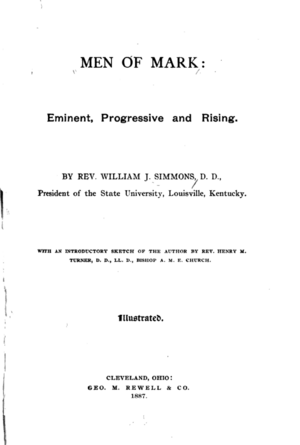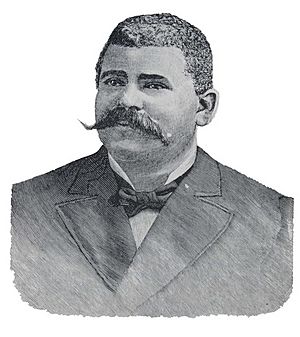Men of Mark facts for kids
 |
|
| Authors | William J. Simmons Henry McNeal Turner |
|---|---|
| Country | United States |
| Language | English |
| Genre | Biography anthology |
| Published | 1887 (Harvard University) |
|
Publication date
|
1887 |
| ISBN | 9781468096811 |
Men of Mark: Eminent, Progressive and Rising is a special book from 1887. It's like a collection (called an anthology) of 177 short life stories (biographies) about important African-American men. It was written by Reverend William J. Simmons, who was a Baptist minister and also ran a college. Many people consider this book to be the most important work about African Americans in the 1800s. A well-known minister named Henry McNeal Turner wrote the introduction to the book.
Contents
About the Author and His Book
When Men of Mark was published, William J. Simmons was a Baptist minister. He was also the president of the State University of Kentucky in Louisville. This was a historically black college, meaning it was founded to educate African American students. Later, the college was even renamed Simmons College in his honor!
Simmons was a very important person in African-American society. Because of his role, he actually knew many of the men he wrote about in his book. This made his biographies very personal and accurate.
What the Book Is About
Simmons used original materials like speeches, sermons, and articles to write his short biographies. He included many famous African-American men and historical figures, such as Crispus Attucks, Frederick Douglass, Henry Highland Garnet, and Alexander Crummell. He also wrote about less famous but still important men.
The men in the book came from all sorts of jobs. There were lawyers, carpenters, pastors, merchants, artists, and scholars. Most of these men had parents who were enslaved, or they themselves were born into slavery. However, most of them gained their freedom during the 1800s.
Simmons strongly supported the idea of black nationalism. This was a movement that encouraged African Americans to be proud of their heritage and build their own communities. Henry McNeal Turner, who wrote the introduction, was also a big supporter of this idea. Simmons became very famous because of his book. He had even planned to write another book about important African-American women, but sadly, he passed away suddenly in 1890.
Why This Book Is Important
Men of Mark is considered a very important book for understanding African-American history in the 1800s. The stories in the book show how important religious leaders were in the lives and identity of African Americans back then. Out of the 177 biographies, 71 were about Christian ministers. This was almost three times more than any other job!
Simmons wrote in his introduction that he wanted these stories to show how people can improve themselves. He hoped the book would be used by students as a guide and inspiration.
Simmons focused on the good things about the lives he wrote about. This was a common way to write history during that time. Another scholar, William H. Brackney, described the biographies as "hagiographic," meaning they were very positive and praising, almost like stories of saints. The book was so important that it was reprinted in 1968.
Around the same time, many other books featuring biographies of African Americans were published. This happened as more Black people gained education and worked to establish their place in American life and history. For example, two books about women of color were published in 1893: Noted Negro Women by Monroe Alpheus Majors and Women of Distinction by Lawson A. Scruggs.
Who Was Featured?
The book includes a wide range of inspiring African-American men. Here are just a few examples of the types of people and their achievements that Simmons highlighted:
- Leaders and Orators: Like Frederick Douglass, a famous speaker and anti-slavery editor.
- Ministers and Bishops: Many religious leaders, such as Bishop James Walker Hood and Bishop Richard Allen, who helped organize churches and fight for civil rights.
- Inventors and Engineers: Such as Granville Woods, an electrician and inventor of telephones and telegraph instruments.
- Artists and Musicians: Including Henry Ossawa Tanner, a rising artist, and Blind Tom Wiggins, a remarkable pianist.
- Politicians and Legislators: Like Robert Smalls, a congressman and former steamboat captain, and Blanche K. Bruce, a United States Senator.
- Educators and Scholars: Such as Professor William Sanders Scarborough, an author of a Greek textbook, and Professor Booker T. Washington, who founded the Tuskegee Normal School.
- Pioneers and Activists: Like Crispus Attucks, considered the first martyr of the Revolutionary War, and Denmark Veazie, a leader in the fight against slavery.
- Business Owners: Including Wiley Jones, who owned a streetcar railroad and a race track.
Simmons wanted to show the many different ways African-American men contributed to society, often overcoming great challenges.
 | William Lucy |
 | Charles Hayes |
 | Cleveland Robinson |


